人教版新目标八年级上册-英语语法知识及练习
- 格式:doc
- 大小:79.50 KB
- 文档页数:8
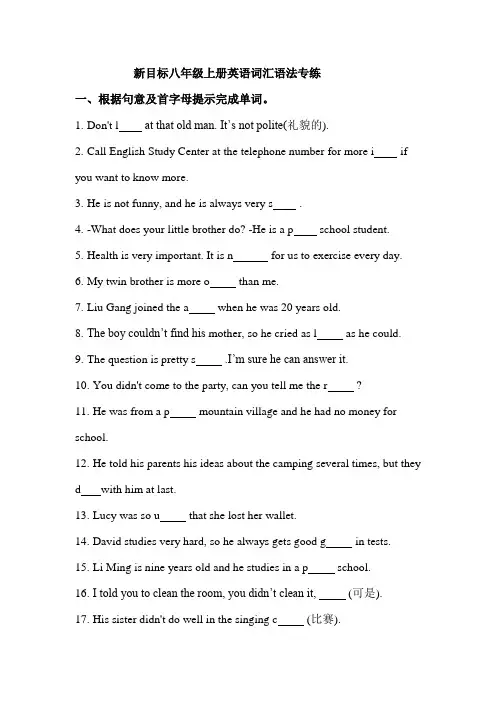
新目标八年级上册英语词汇语法专练一、根据句意及首字母提示完成单词。
1.Don't l at that old man. It’s not polite(礼貌的).2.Call English Study Center at the telephone number for more i if you want to know more.3.He is not funny, and he is always very s .4.-What does your little brother do? -He is a p school student.5.Health is very important. It is n for us to exercise every day.6.My twin brother is more o than me.7.Liu Gang joined the a when he was 20 years old.8.The boy couldn’t find his mother, so he cried as l as he could.9.The question is pretty s .I’m sure he can answer it.10.You didn't come to the party, can you tell me the r ?11.He was from a p mountain village and he had no money for school.12.He told his parents his ideas about the camping several times, but theyd with him at last.13.Lucy was so u that she lost her wallet.14.David studies very hard, so he always gets good g in tests.15.Li Ming is nine years old and he studies in a p school.16.I told you to clean the room, you didn’t clean it, (可是).17.His sister didn't do well in the singing c (比赛).18.The little boy is very smart but not (工作努力的).19.Grace is three years old and she can speak (清楚地).20.It is (必要的) for as to exercise every day.21.The British teacher is very humorous. He always tells us (笑话).22.He is good at many things and he is a (有才能的) person.23.These are two (票)for the concert this evening. Can you go with me?24.My English teacher is always (准备好的) with advice for our study and life.25.I think it is a really (有教育意义的) movie.26.Li Lei is more (外向的) than Lin Tao.27.He is a (辛勤的) boy.28.We can get some useful (信息) on the Internet.29.He (赢得) a beautiful notebook in the English contest.30.It's (必要的;必需的) for kids to do more housework at home.二、用所给单词的适当形式填空。
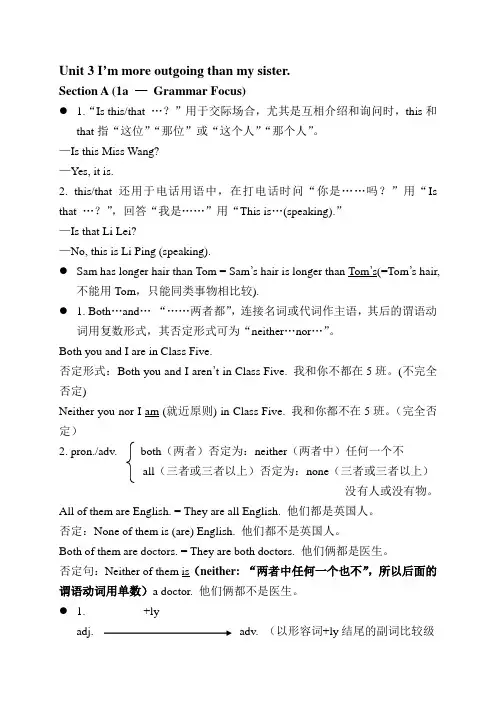
Unit 3 I’m more outgoing than my sister.Section A (1a —Grammar Focus)● 1.“Is this/that …?”用于交际场合,尤其是互相介绍和询问时,this和that指“这位”“那位”或“这个人”“那个人”。
—Is this Miss Wang?—Yes, it is.2. this/that还用于电话用语中,在打电话时问“你是……吗?”用“Is that …?”,回答“我是……”用“This is…(speaking).”—Is that Li Lei?—No, this is Li Ping (speaking).●Sam has longer hair than Tom = Sam’s hair is longer than Tom’s(=Tom’s hair,不能用Tom,只能同类事物相比较).● 1. Both…and…“……两者都”,连接名词或代词作主语,其后的谓语动词用复数形式,其否定形式可为“neither…nor…”。
Both you and I are in Class Five.否定形式:Both you and I aren’t in Class Five. 我和你不都在5班。
(不完全否定)Neither you nor I am (就近原则) in Class Five. 我和你都不在5班。
(完全否定)2. pron./adv. both(两者)否定为:neither(两者中)任何一个不all(三者或三者以上)否定为:none(三者或三者以上)没有人或没有物。
All of them are English. = They are all English. 他们都是英国人。
否定:None of them is (are) English. 他们都不是英国人。
Both of them are doctors. = They are both doctors. 他们俩都是医生。
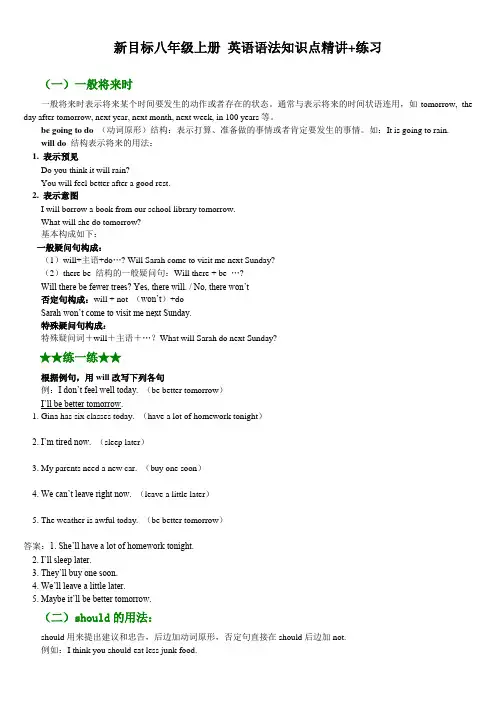
新目标八年级上册英语语法知识点精讲+练习(一)一般将来时一般将来时表示将来某个时间要发生的动作或者存在的状态。
通常与表示将来的时间状语连用,如tomorrow, the day after tomorrow, next year, next month, next week, in 100 years等。
be going to do(动词原形)结构:表示打算、准备做的事情或者肯定要发生的事情。
如:It is going to rain.will do结构表示将来的用法:1. 表示预见Do you think it will rain?You will feel better after a good rest.2. 表示意图I will borrow a book from our school library tomorrow.What will she do tomorrow?基本构成如下:一般疑问句构成:(1)will+主语+do…? Will Sarah come to visit me next Sunday?(2)there be 结构的一般疑问句:Will there + be …?Will there be fewer trees? Yes, there will. / No, there won’t否定句构成:will + not (won’t)+doSarah won’t come to visit me next Sunday.特殊疑问句构成:特殊疑问词+will+主语+…?What will Sarah do next Sunday?★★练一练★★根据例句,用will改写下列各句例:I don’t feel well today. (be better tomorrow)I’ll be better tomorrow.1. Gina has six classes today. (have a lot of homework tonight)_____________________________2. I’m tired now. (sleep later)_____________________________3. My parents need a new car. (buy one soon)_____________________________4. We can’t leave right now. (leave a little later)_____________________________5. The weather is awful today. (be better tomorrow)_____________________________答案:1. She’ll have a lot of homework tonight.2. I’ll sleep later.3. They’ll buy one soon.4. We’ll leave a little later.5. Maybe it’ll be better tomorrow.(二)should的用法:should用来提出建议和忠告,后边加动词原形,否定句直接在should后边加not.例如:I think you should eat less junk food.我认为你应该少吃垃圾食品。
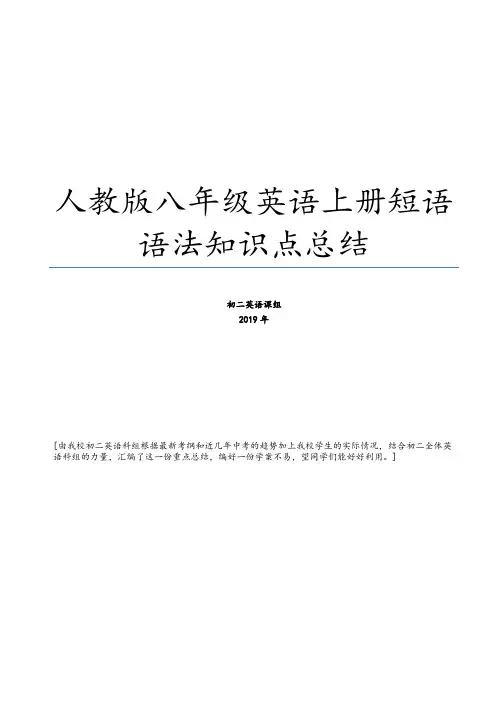
人教版八年级英语上册短语语法知识点总结初二英语课组2019年[由我校初二英语科组根据最新考纲和近几年中考的趋势加上我校学生的实际情况,结合初二全体英语科组的力量,汇编了这一份重点总结,编好一份学案不易,望同学们能好好利用。
]Unit 1 Where did you go on vacation一、必背单词短语。
Section A1.Where did you go on vacation? (P. 1)on vacation意为“在度假”,结构“on+名词”表示“在某种状态中”。
例句:My family went to Hainan on vacation last year.2....visited my uncle (P. 1)visit此处用作及物动词,后接人或物做宾语,意为“拜访、看望”,后接表示地点的名词,意为“参观、游览”。
例句:I visited my grandmother last week.例句:Do you want to visit Shanghai?3....go with anyone? (P. 2)(1)anyone用作不定代词,意为“有人、任何人”,相当于anybody,用于疑问句和否定句中,在肯定句中用someone或者somebody。
但是anyone也可以用在肯定句中,表示“任何一个人”。
例句:Did you meet anyone friendly in that city?例句:Anyone can be helpful in some way.(2)anyone只能指人,不可以指物,后面不接of短语;any one既可以指人也可以指物,后可接of短语。
例句:You can ask any one of us about this question.4....buy anything special? (P. 2)(1)buy用作双宾语动词,表示“买”,常用的结构为“buy sb. sth.”或者“buy sth. for sb.”,表示“为某人买某物”。
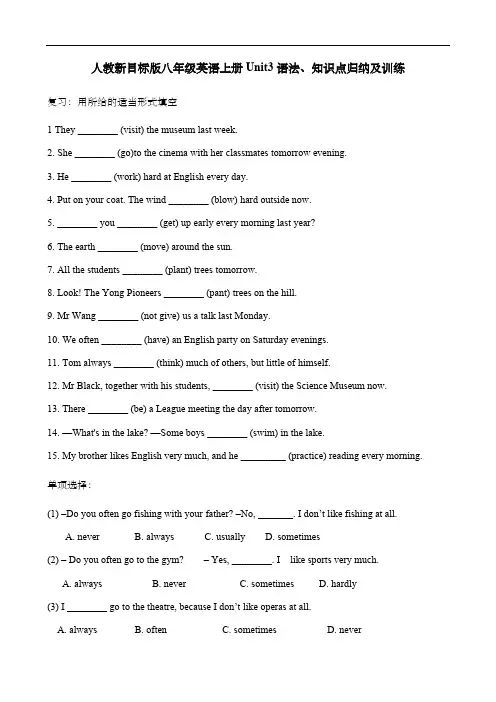
人教新目标版八年级英语上册Unit3语法、知识点归纳及训练复习:用所给的适当形式填空1 They ________ (visit) the museum last week.2. She ________ (go)to the cinema with her classmates tomorrow evening.3. He ________ (work) hard at English every day.4. Put on your coat. The wind ________ (blow) hard outside now.5. ________ you ________ (get) up early every morning last year?6. The earth ________ (move) around the sun.7. All the students ________ (plant) trees tomorrow.8. Look! The Yong Pioneers ________ (pant) trees on the hill.9. Mr Wang ________ (not give) us a talk last Monday.10. We often ________ (have) an English party on Saturday evenings.11. Tom always ________ (think) much of others, but little of himself.12. Mr Black, together with his students, ________ (visit) the Science Museum now.13. There ________ (be) a League meeting the day after tomorrow.14. —What's in the lake? —Some boys ________ (swim) in the lake.15. My brother likes English very much, and he _________ (practice) reading every morning.单项选择:(1) –Do you often go fishing with your father? –No, _______. I don’t like fishing at all.A. neverB. alwaysC. usuallyD. sometimes(2) – Do you often go to the gym? – Yes, ________. I like sports very much.A. alwaysB. neverC. sometimesD. hardly(3) I ________ go to the theatre, because I don’t like operas at all.A. alwaysB. oftenC. sometimesD. never(4) He says he will come to see us tomorrow afternoon.A. sometimeB. some timeC. sometimesD. some times(5) Speak aloud, please! I can _____ hear you.A. almostB. hardlyC. usuallyD. sometimes(6) My cousin wants to keep slim. She does exercise every morning and __ eats meat.A. hardlyB. alwaysC. usuallyD. often(7) —Miss Zhou is very popular with the students.—Yes. Her classes are_________ lively and interesting.A. alwaysB. sometimesC. hardlyD. never(8) —Have you ever been to Disneyland?—No, ______.I hope I can go there next year.A. alwaysB. sometimesC. neverD. often(9) —Zhang Lili, "the most beautiful teacher", has moved us deeply.—Yes, and she is__________ popular with her students.A. sometimesB. neverC. alwaysD. hardly(10) I don’t think fast food is good for our health, so I _______ go to MacDonald.A. hardlyB. alwaysC. usuallyD. often语法学习:形容词是用来修饰名词或不定代词,说明事物和人的性质和特征的一类词,在句子中用作定语、表语、宾语补足语;而副词用以修饰动词、形容词或其他副词,在句子中作状语、表语、补语和定语。

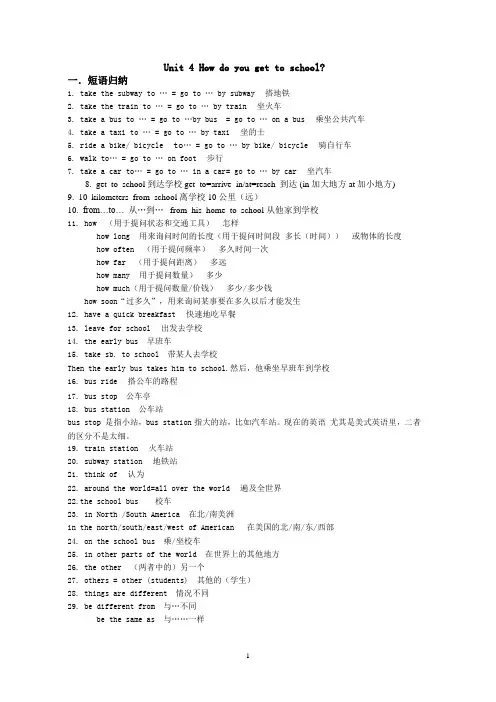
Unit 4 How do you get to school?一.短语归纳1. take the subway to …= go to … by subway搭地铁2. take the train to …= go to … by train坐火车3. take a bus to …= go to …by bus= go to … on a bus乘坐公共汽车4. take a taxi to …= go to … by taxi坐的士5. ride a bike/ bicycle to…= go to … by bike/ bicycle骑自行车6. walk to…= go to … on foot步行7. take a car to…= go to … in a car= go to … by car坐汽车8. get to school到达学校get to=arrive in/at=reach 到达 (in加大地方at加小地方)9. 10 kilometers from school离学校10公里(远)10. from…to…从…到…from his home to school 从他家到学校11. how(用于提问状态和交通工具)怎样how long用来询问时间的长度(用于提问时间段多长(时间))或物体的长度how often(用于提问频率)多久时间一次how far(用于提问距离)多远how many用于提问数量)多少how much(用于提问数量/价钱)多少/多少钱how soon“过多久”,用来询问某事要在多久以后才能发生12. have a quick breakfast快速地吃早餐13. leave for school出发去学校14. the early bus 早班车15. take sb. to school 带某人去学校Then the early bus takes him to school.然后,他乘坐早班车到学校16. bus ride搭公车的路程17. bus stop 公车亭18. bus station 公车站bus stop 是指小站,bus station指大的站,比如汽车站。
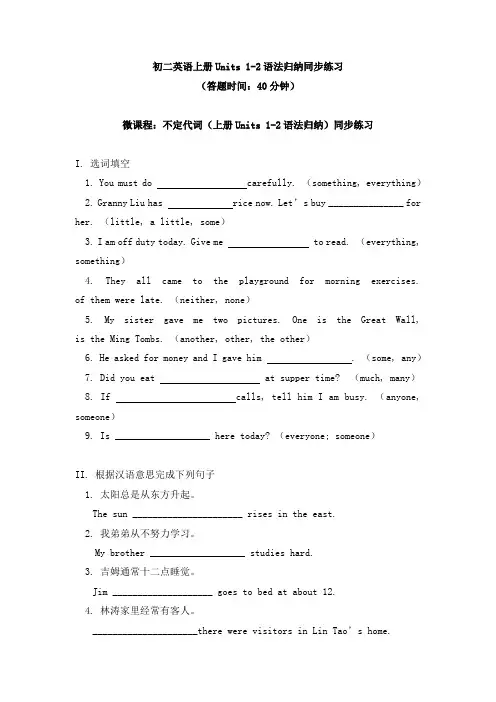
初二英语上册Units 1-2语法归纳同步练习(答题时间:40分钟)微课程:不定代词(上册Units 1-2语法归纳)同步练习I. 选词填空1. You must do carefully. (something, everything)2. Granny Liu has rice now. Let’s buy _______________ forher. (little, a little, some)3. I am off duty today. Give me to read. (everything,something)4. They all came to the playground for morning exercises. of them were late. (neither, none)5. My sister gave me two pictures. One is the Great Wall, is the Ming Tombs. (another, other, the other)6. He asked for money and I gave him . (some, any)7. Did you eat at supper time? (much, many)8. If calls, tell him I am busy. (anyone,someone)9. Is ___________________ here today? (everyone; someone)II. 根据汉语意思完成下列句子1. 太阳总是从东方升起。
The sun ______________________ rises in the east.2. 我弟弟从不努力学习。
My brother ___________________ studies hard.3. 吉姆通常十二点睡觉。
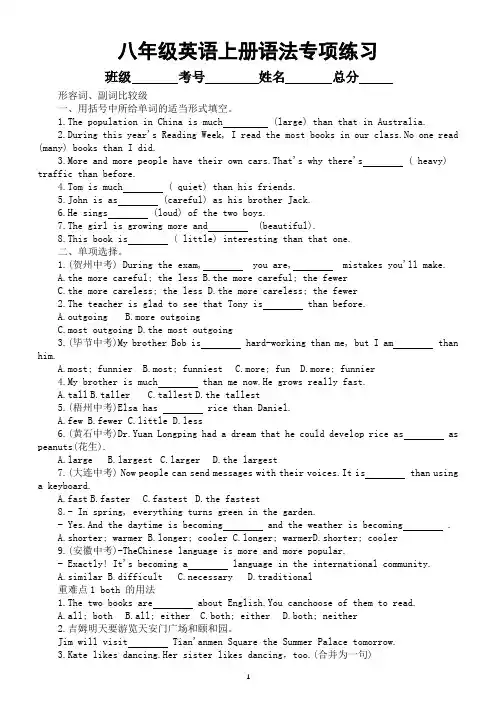
八年级英语上册语法专项练习班级考号姓名总分形容词、副词比较级一、用括号中所给单词的适当形式填空。
1.The population in China is much (large) than that in Australia.2.During this year's Reading Week, I read the most books in our class.No one read (many) books than I did.3.More and more people have their own cars.That's why there's ( heavy)traffic than before.4.Tom is much ( quiet) than his friends.5.John is as (careful) as his brother Jack.6.He sings (loud) of the two boys.7.The girl is growing more and (beautiful).8.This book is ( little) interesting than that one.二、单项选择。
1.(贺州中考) During the exam, you are, mistakes you'll make.A.the more careful; the lessB.the more careful; the fewerC.the more careless; the lessD.the more careless; the fewer2.The teacher is glad to see that Tony is than before.A.outgoingB.more outgoingC.most outgoingD.the most outgoing3.(毕节中考)My brother Bob is hard-working than me, but I am thanhim.A.most; funnierB.most; funniestC.more; funD.more; funnier4.My brother is much than me now.He grows really fast.A.tallB.tallerC.tallestD.the tallest5.(梧州中考)Elsa has rice than Daniel.A.fewB.fewerC.littleD.less6.(黄石中考)Dr.Yuan Longping had a dream that he could develop rice as as peanuts(花生).rgergestrgerD.the largest7.(大连中考) Now people can send messages with their voices.It is than usinga keyboard.A.fastB.fasterC.fastestD.the fastest8.- In spring, everything turns green in the garden.- Yes.And the daytime is becoming and the weather is becoming .A.shorter; warmerB.longer; coolerC.longer; warmerD.shorter; cooler9.(安徽中考)-TheChinese language is more and more popular.- Exactly! It's becoming a language in the international community.A.similarB.difficultC.necessaryD.traditional重难点1 both 的用法1.The two books are about English.You canchoose of them to read.A.all; bothB.all; eitherC.both; eitherD.both; neither2.吉姆明天要游览天安门广场和颐和园。
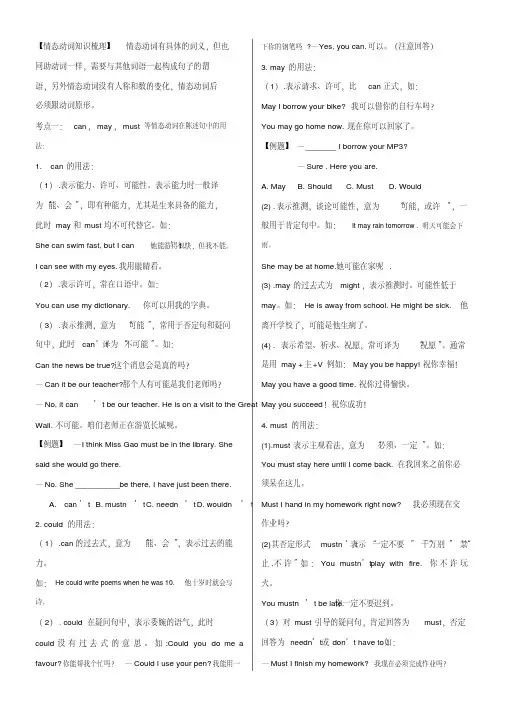
【情态动词知识梳理】情态动词有具体的词义,但也同助动词一样,需要与其他词语一起构成句子的谓语,另外情态动词没有人称和数的变化,情态动词后必须跟动词原形。
考点一:can,may,must等情态动词在陈述句中的用法:1.can的用法:(1).表示能力、许可、可能性。
表示能力时一般译为“能、会”,即有种能力,尤其是生来具备的能力,此时may和must均不可代替它。
如:She can swim fast, but I can’t .她能游得很快,但我不能。
I can see with my eyes.我用眼睛看。
(2).表示许可,常在口语中。
如:You can use my dictionary. 你可以用我的字典。
(3).表示推测,意为“可能”,常用于否定句和疑问句中,此时can’t译为“不可能”。
如:Can the news be true?这个消息会是真的吗?—Can it be our teacher?那个人有可能是我们老师吗?—No, it can’t be our teacher. He is on a visit to the Great Wall.不可能。
咱们老师正在游览长城呢。
【例题】—I think Miss Gao must be in the library. Shesaid she would go there.—No. She __________be there, I have just been there.A.can’tB. mustn’tC. needn’tD. wouldn’t2. could的用法:(1).can的过去式,意为“能、会”,表示过去的能力。
如:He could write poems when he was 10. 他十岁时就会写诗。
(2). could在疑问句中,表示委婉的语气,此时could没有过去式的意思。
如:Could you do me a favour?你能帮我个忙吗?—Could I use your pen?我能用一下你的钢笔吗?—Yes, you can.可以。
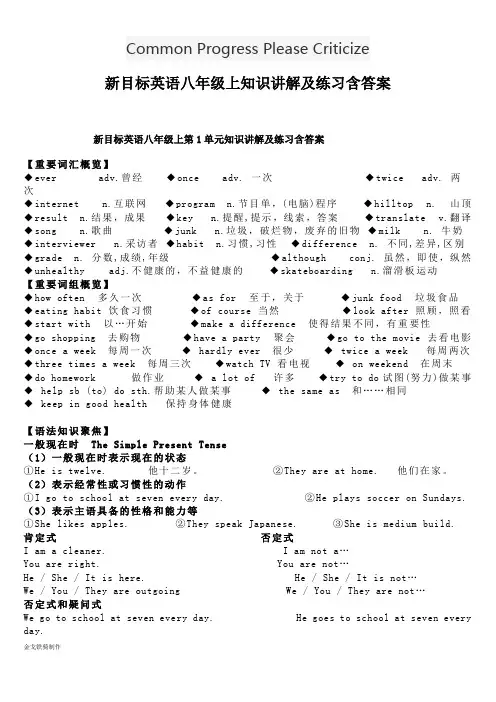
新目标英语八年级上知识讲解及练习含答案新目标英语八年级上第1单元知识讲解及练习含答案【重要词汇概览】◆ever adv.曾经◆once adv. 一次◆twice adv. 两次◆internet n.互联网◆program n.节目单,(电脑)程序◆hilltop n. 山顶◆result n.结果,成果◆key n.提醒,提示,线索,答案◆translate v.翻译◆song n.歌曲◆junk n.垃圾,破烂物,废弃的旧物◆milk n. 牛奶◆interviewer n.采访者◆habit n.习惯,习性◆difference n. 不同,差异,区别◆grade n. 分数,成绩,年级◆although conj. 虽然,即使,纵然◆unhealthy adj.不健康的,不益健康的◆skateboarding n.溜滑板运动【重要词组概览】◆how often 多久一次◆as for 至于,关于◆junk food 垃圾食品◆eating habit 饮食习惯◆of course 当然◆look after 照顾,照看◆start with 以…开始◆make a difference 使得结果不同,有重要性◆go shopping 去购物◆have a party 聚会◆go to the movie 去看电影◆once a week 每周一次◆ hardly ever 很少◆twice a week 每周两次◆three times a week 每周三次◆watch TV 看电视◆ on weekend 在周末◆do homework 做作业◆ a lot of 许多◆try to do试图(努力)做某事◆ help sb (to) do sth.帮助某人做某事◆ the same as 和……相同◆ keep in good health 保持身体健康【语法知识聚焦】一般现在时The Simple Present Tense(1)一般现在时表示现在的状态①He is twelve. 他十二岁。
词汇点睛一.基础词汇,写出下列单词。
1较好的(地)2辛勤的3哪一个4有才能的5关心6清楚地7爱交际的8大声地9安静地10极好的二.重点词汇讲解1. better是good/well的比较级,意为“更好的”“较好地”.2.loudly 意为“大声地”是由形容词loud转变的副词用来修饰动词。
和它相同的副词还有quietly ,clearly ,truly 等。
3 .win 意为“获胜,赢”动词,其后接比赛和活动类,但是不能接人.例如,My brother often wins the ping pong games.其过去式为won 名词为winner “获胜者”.4.which“哪一个”特殊疑问词通常对于名词的定语提问5 both “两者都” 位于句中be,情态动词,助动词之后,实意动词之前。
例如,They are both teachers.他们两个都是老师。
We can both ride a bike.我们俩个都会骑车。
My parents both like noodles.我父母都喜欢面条。
Both…and 意为“…和…都” “不仅…而且…”例如Both he and I like watching TV.他和我都喜欢看电视。
6 .as…as意为“和….一样”中接形容词,副词原形。
not so(as)…as“和…不一样”.例如I am as tall as my friend.我和我朋友一样高。
句型透视一、必背句1.Tom比Sam更聪明吗? 不,Sam比Tom更聪明。
Is Tom Sam? No, he . Sam isthan Tom.2.Tara和Tina学习一样努力。
Tara works hard Tim.3.你的父亲和母亲谁更受欢迎?Who is , your father or your mother?二.例句解析1. Both Sam and Tom can play the drums , but Sam plays them better than Tom. Sam 和Tom 都会打鼓但是Sam比Tom 打得更好。
人教新目标英语八年级上册Unit 1 sectionA语法知识点总结Unit 1 Where did you go on vacation?一般过去时态的概念:1.表示过去某时间发生的动作或存在的状态。
2.表示过去经常性习惯性的动作。
一般过去时常用的标志词有:yesterday,the day before yesterday,last week/month/year, just now, …ago,in+过去时间…一.用Be动词的一般过去时(1)肯定句式:主语+ was / were + 其它.(2)否定句式:主语+ wasn’t /weren’t+ 其它.(3)一般疑问句:Was/Were + 主语+ 其它?肯定回答:Yes,主语+ was / were .否定回答:No,主语+ wasn’t /weren’t.(4)特殊疑问词+was/were+主语+其他?肯定句:The air was clean yesterday.否定句:The air wasn't clean yesterday.一般疑问句:Was the air clean yesterday?肯定回答:Yes, it was.否定回答:No, it wasn't.特殊疑问句:How was the air yesterday?二.行为动词(v.)的一般过去时态(1)肯定句式:主语+ v-ed+ 其它.【do , does---did】(2)否定句式:主语+ didn’t + v原形+ 其它. 【did not = didn’t】(3)一般疑问句:Did + 主语+ v原形+ 其它?肯定回答:Yes,主语+did.否定回答:No,主语+did’t.(4)特殊疑问词+did+主语+v.原形+其他?肯定句:I rode a horse last Sunday.否定句:I didn‘t ride a horse last Sunday.一般疑问句:Did you ride a horse last Sunday? 肯定回答:Yes, I did.否定回答:No, I didn't.特殊疑问句:(1)What did you do last Sunday?(2)When did you ride a horse?三、动词过去式的构成1. 规则动词的过去式1) 一般情况下,在动词原形后面加-ed。
人教新目标英语八年级上册unit1-Unit4单元重点知识复习人教新目标英语八年级上册Unit1 & Unit2 知识点汇总一.Unit1 语法“复合不定代词的用法”1.复合不定代词的构成。
指物:something everything anything nothing指人:someone everyone anyone no onesomebody everybody anybody nobody2. 复合不定代词的用法:①anything , anyone, anybody 常用于否定句及一般疑问句;当anything 表示“任何事”,anyone, anybody 表示“无论谁,任何人”时,用于肯定句。
I don’t want to talk to anyone now. 用于否定句。
Can I ask anyone who knows the answer? 用于一般疑问句。
Anyone knows the answer must leave the classroom. 表示无论谁,用于肯定句。
What would you like to drink? Anything is ok. 表示任何东西,用于肯定句。
②当复合不定代词做主语时,谓语动词用单数。
Everyone here is from China.Everything begins to grow when Spring comes.③形容词放在复合不定代词之后。
Would you like to buy anything special?Can I meet anyone interesting?④当表示请求,邀请,提出建议时,用something, someone, somebody.Would you like something to eat?Why not ask someone special?Why didn’t you buy something for your mother?Unit2 语法“频率副词”How often 常用于对频率的提问,意为“多长时间一次”,其答语可以是once/ twice / three times a week; always/ usually/ often/ sometimes/ hardly ever/ never 等表示时间频率的副词及短语。
语法一:复合不定代词2.带some的复合不定代词常用于肯定句中;带any的复合不定代词常用于否定句或一般疑问句中。
但在表示委婉的疑问和希望得到对方肯定答复的疑问句以及表示反问的问句中,也可使用含some复合不定代词。
1.我想吃点东西。
I’d like _____________ to eat.2.今天有人给我打电话吗?Did ________ call me today?3.你有话要说吗?Do you have to say ?4.你想喝点什么吗?Would you like to drink?3. 当形容词修饰不定代词时,应放在其后面。
(形容词后置)例如:1.这本书里有什么新东西吗?Is there __________ _______ in this book?2. 我有有趣的事情要告诉你I have ___________ ________ to tell you..3.你买什么特别的东西了吗?Did you buy ?4.你去什么有趣的地方了吗??4. 由some, any, no, every构成的复合不定代词作主语时,都作单数看待,其谓语动词用单数第三人称形式。
例如:1.我手表坏了。
wrong with my watch.. 2. Nobody (知道) what the future will be like.3.钱不是万能的Money isn’t .5.除no one以外,其他复合不定代词都写成一个词。
复合不定代词练习题:一、选择题:( ) 1. I’m hungry. I want ______ to eat.A. anythingB. somethingC. everythingD. nothing( ) 2. —Do you have ______ to say for yourself?—No, I have ______ to say.A. something; everythingB. nothing; somethingC. everything; anythingD. anything; nothing( ) 3. Why not ask ______ to help you?A. everyoneB. someoneC. anyoneD. none( ) 4. Everything ______ ready. We can start now.A. areB. isC. beD. were( ) 5. There’s ______ with his eyes. He’s OK.A. anything wrongB. wrong somethingC. nothing wrongD. wrong nothing( ) 6. She listened carefully, but heard ______.A. anyoneB. someoneC. everyoneD. nothing( ) 7. Everything goes well, ______?A. is itB. isn’t itC. do theyD. doesn’t it()8.. ________ of us is active in English class.A. EveryB. Every oneC. EveryoneD. Anybody()9.—The exam was difficult,wasn't it?—No,but I don't think______ could pass it.A.somebodyB.anybodyC.nobodyD.everybody二、用something, anything, anyone, nothing, everything, no one, everyone填空。
人教新目标英语八年级上册单元知识点总结+练习题Unit 2 How often do you exercise?本单元重点句子读背What do you usually do on weekends? I always exercise.What do they do on weekends? They often help with housework.What does she do on weekends? She sometimes goes shopping.How often do you go to the movies? I go to the movies maybe once a month.How often does he watch TV? He hardly ever watches TV. Do you go shopping? No, I never go shopping.用法1) be good for对什么有益2) be bad for对什么有害3) want to do sth想做某事4) want sb to do sth想某人做某事5)try to do sth尽量做某事6)help sb (to) do sth帮助某人做某事7)ask sb about sth 问某人关于某事一.语法一般现在时:一般现在时:表示通常性、规律性、习惯性的状态或者动作.通常与副词sometimes, often, usually, always, every day (year, month ),等时间状语连用。
在一般现在时中,当主语是第三人称单数时,谓语动词要用第三人称单数形式,即常在动词原形后加-s或-es。
主语不是第三人称单数,动词用原形。
例如:1.She has lunch at twelve. 她十二点吃午餐。
2.Tom and Mike like waching TV.肯定句: She often watches TV in the evening.否定句(加助动词don’t 或doesn’t):She doesn’t often watches tv in the evening.一般疑问句(把do或者does提前):Does she watches TV in the evening?肯定回答: Yes, she does. 否定回答: No, she doesn’t.动词的三单形式规则:1)一般动词+s:make –makes;2)以s、sh、ch、o、z、x结尾的动词+es:wash –washes go –goes;3)以辅音字母加y结尾的动词改y为i再加es:fly –flies cry –cries;4)以元音字母加y结尾的动词直接加s:play –plays。
单元语法小专题(Grammar Focus)语法精讲一、祈使句祈使句常用来表示命令、指示、请求、要求或建议等。
1.当主语是第二人称you时,you通常被省略。
这种祈使句一般以动词原形开头。
它的否定形式是在动词原形前加don't。
如:Be more careful next time.下次仔细点。
Come to school earlier next time.下次早点来学校。
Don't play computer games.不要玩电脑游戏。
在祈使句的句首或句尾加please,可以使祈使句的语气更委婉。
但在句尾加please时,要在please前加逗号。
如:Please speak loudly.=Speak loudly,please.请大声讲话。
2.带有第一、第三人称主语的祈使句通常以let为引导词,一般用来提建议。
如:Let's watch the cartoon now.现在我们看卡通片吧。
【拓展】let's/let me祈使句的否定形式是let's/let me not…或don't let's/let me…;“let+第三人称”的否定形式为“don't let+第三人称…”。
如:Let's not play soccer in the street.我们不要在街上踢足球。
Don't let her watch so much TV.不要让她看这么多电视。
二、可数名词与不可数名词普通名词分为可数名词和不可数名词。
1.可数名词可以用具体的数词来修饰,也可以用“数词+计量名词+of+可数名词的复数形式”来表示。
如:three apples三个苹果;two bags of watermelons 两袋西瓜。
2.不可数名词没有复数形式,表示量时用“数词+计量名词+of+不可数名词”结构。
如:a cup of milk 一杯牛奶。
人教版新目标八年级上册英语语法知识点精讲+练习(一)一般将来时一般将来时表示将来某个时间要发生的动作或者存在的状态。
通常与表示将来的时间状语连用,如tomorrow, the day after tomorrow, next year, next month, next week, in 100 years等。
be going to do(动词原形)结构:表示打算、准备做的事情或者肯定要发生的事情。
如:It is going to rain.will do结构表示将来的用法:1. 表示预见Do you think it will rain? You will feel better after a good rest.2. 表示意图I will borrow a book from our school library tomorrow.What will she do tomorrow?基本构成如下:一般疑问句构成:(1)will+主语+do…? Will Sarah come to visit me next Sunday?(2)there be 结构的一般疑问句:Will there + be …?Will there be fewer trees? Yes, there will. / No, there won’t否定句构成:will + not (won’t)+doSarah won’t come to visit me next Sunday.特殊疑问句构成:特殊疑问词+will+主语+…?What will Sarah do next Sunday?根据例句,用will改写下列各句例:I don’t feel well today. (be better tomorrow)I’ll be better tomorrow.1. Gina has six classes today. (have a lot of homework tonight)_____________________________2. I’m tired now. (sleep later)_____________________________3. My parents need a new car. (buy one soon)_____________________________4. We can’t leave right now. (leave a little later)_____________________________5. The weather is awful today. (be better tomorrow)_____________________________答案:1. She’ll have a lot of homework tonight.2. I’ll sleep later.3. They’ll buy one soon.4. We’ll leave a little later.5. Maybe it’ll be better tomorrow.(二)should的用法:should用来提出建议和忠告,后边加动词原形,否定句直接在should后边加not.例如:I think you should eat less junk food.我认为你应该少吃垃圾食品。
She drives a lot and she seldom walks. So I think she should walk a lot.她经常开车,很少走路。
所以我认为她应该多走路。
Students shouldn’t spend too much time playing computer games.学生们不应当花太多的时间玩计算机游戏。
学习向别人提建议的几种句式:(1)I think you should…(2)Well, you could…(3)Maybe you should …(4)Why don’t you…?(5)What about doing sth.?(6)You’d better do sth.用should或shouldn’t填空1. I can’t sleep th e night before exams.You ______ take a warm shower before you go to bed.2. Good friends ______ argue each other.3. There is little milk in the glass. We _______ buy some.4. They didn’t invite you? Maybe you ______ be friendlier.5. I am a little bit overweight. So I think I _______ do exercises every day.答案:1. should 2. shouldn’t 3. should 4. should 5. should(三)过去进行时过去进行时表示过去某一点时间正在进行的动作或者过去某一段时间内一直进行的动作。
1. 构成was /were + doing,例如:I was watching TV at 9 o’clock last night.at 9 o’clock last night是时间点They were playing football all afternoon.all afternoon是时间段2. 过去进行时的标志词at 8 o’clock last night, this time yesterday等。
例如:I was having lunch at home this time yesterday. 昨天的这个时候我正在吃午饭。
At that time she was writing a book. 那阵子她在写一本书。
(表示她在那段时间里一直在做那件事情。
)练习用括号中所给动词的适当形式填空。
1. This time yesterday I ____ ______(read)books.2. At 9 o’clock last Sunday they ______ ______(have)a party.3. When I _____(come)into the classroom, she ________ ______(read)a storybook.4. She _____ ______(play)computer games while her mother ____ ______(cook)yesterday afternoon.5. I _____ ______(have)a shower when you _______(call)me yesterday.答案:1. was reading 2. were having 3. came; was reading 4. was playing; was cooking 5. was having; called (四)间接引语形成步骤:(1)不要逗号,冒号,引号(2)要考虑到人称的变化(人称的变化与汉语是一致的)(3)要考虑时态的变化(4)要考虑时间状语、地点状语和语示代词的变化。
1.2.★★练一练★★用括号中所给动词的适当形式填空。
1. She said I _____(be)hard-working.2. Peter told me he _____(be)bored yesterday.3. She said she _____(go)swimming last Sunday.4. Bobby said he _____(may)call me later.5. Antonio told me he _____(read)a book then.答案:1. was 2. was 3. went 4. might 5. was reading请转述他人说的话:1. I go to the beach every Saturday. (Tom)2. I can speak three languages. (Lucy)3. I will call you tomorrow. (Mike)4. I’m having a surprise party for Lana. (she)(五)if引导的条件状语从句结构:if+一般现在时,主语+将来含义:如果……,将要……例如:If you ask him, he will help you. 如果你请求他,他会帮助你。
If need be, we’ll work a ll night. 如果需要,我们就干个通宵。
★★练一练★★根据中文提示,完成句子。
1. 如果你参加聚会,你将会过得很开心。
If you ________ the party, you __________.2. 如果明天下雨,我们将不去野餐。
If it __________ tomorrow, we ___________.3. 如果你经常听英文歌,你将会喜欢英语的。
If you often ________, you _________________.答案:1. If you go to the party, you will have a good time2. If it rains tomorrow, we won’t go to the picnic3. If you often listen to English songs, you’ll like English二. 完形填空特点及解题思路(一)题型分类与特点完形填空试题是在给出的一篇短文中有目的地拿掉若干个词,留下一些空格,要求考生借助短文保留的部分,从所给的短文整体出发,在正确理解短文意思的基础上,根据句子和句子间的内在联系、词的用法和习惯搭配等,用适当的词或词语填空,使补全后的短文意思通顺、前后连贯、结构完整。
这种题型测试的内容从形式上看是单词或短语的填空,但它必须注意到短文中上、下文意思连贯、词语搭配和语法结构正确,所以在空格上所填的词必须符合语义适用和语法正确两条原则,只考虑某一侧面都可能导致错误。
中考中完形填空试题的基本题型分两类:完形填空选择题和完形填空题。
1. 完形填空选择题:该题型的特点是将一篇短文中若干词语抽掉留下空格,对每一空格提供若干个选择项,要求考生通读短文后,在理解短文意思的基础上,运用所学的词汇、句型、语法等语言知识,从所提供的备选项中选出一个最佳答案,使短文内容完整正确。